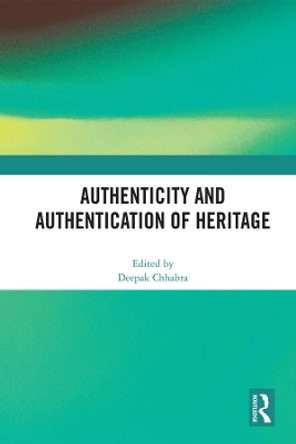Description
This book proposes that sustainable marketing should be founded on a higher level of consciousness, governed by the Eastern ethical principles of dharma and karma. It suggests a socially responsible, integrated marketing strategy to boost transformational heritage tourism.
The book puts forward a framework to promote and inspire transformative heritage tourism from a sustainable marketing perspective. Drawing on examples from different parts of the world such as Thailand, China, USA, India, Australia, United Kingdom, Spain, and Hong Kong, it takes a unique approach by integrating elements associated with distributive justice, procedural justice, morally motivated existentialist authentic experiences, and the wellbeing of visited and visiting environments. The book pivots on the planning and marketing of heritage of communities such as local, descendent, and indigenous across eight broad themes: 1) promotion and sustainable branding of heritage tourism; 2) empowerment of indigenous communities; 3) authenticity and conservation of heritage; 4) safeguarding of art, culture and cultural landscapes; 5) economic viability for the host communities; 6) interpretation and resolution of dissonant heritage representations; 7) stimulating audience engagement and co-created mindful spaces and; 8) facilitating moral consciousness and stimulating lasting inner transformation in guests and hosts. Scholars can replicate and/or test the proposed guided sustainable marketing model, transformative heritage tourism pathway adapted from the need, activities, wellbeing sequential path of transformation and the socially responsible sustainable marketing doctrine guided by the principles of 'dharma' and 'karma.' This book is unique as it stresses on eudaimonia as the ultimate goal of wellbeing and argues that its pursuit can steer the sustained transformation route towards a higher sense of consciousness and responsible production and consumption of heritage resources.
In summary, this book contributes towards advancing the dialogue on sustainable marketing and transformative heritage tourism. It will appeal to researchers, undergraduates and practitioners interested in sustainable marketing, transformative heritage tourism and social, ecological, cultural and economic welfare of visited and visiting destinations.
About the Author
Deepak Chhabra is an Associate Professor in the School of Community Resources and Development (at Arizona State University, Phoenix, USA) who specializes in socio-economic impacts of tourism and sustainable management and marketing of culture and heritage. She also holds the position of Global Futures Scientist at the Julie Ann Wrigley Global Futures Laboratory, Arizona State University. Her research specifically focuses on transformative paradigms, authenticity and authentication of heritage, and designing smart and sustainable marketing strategies in hospitality and tourism that can foster social, cultural, and economic equity/capital in local, regional, and global communities. She serves as an editorial board member for several leading journals in her field. She has authored more than sixty articles in refereed journals. She has also authored and edited several books. Her first book (on sustainable marketing of cultural and heritage tourism) is recognized, throughout the world, by academicians as well as the practitioners. Her sustainable marketing model, from this book, has been used as a blueprint by several cultural and heritage institutions and government agencies across the globe. She recently co-edited a book titled 'sustainable development and resilience of tourism. '
Book Information
ISBN 9781032386683
Author Deepak Chhabra
Format Paperback
Page Count 288
Imprint Routledge
Publisher Taylor & Francis Ltd






